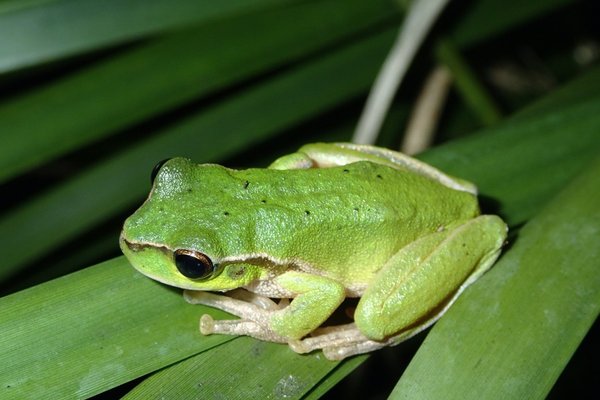Frogs surviving the flames: Citizen scientists reveal frogs calling across the fire zone
We have made a big leap in our understanding of how frogs respond to fire, thanks to citizen scientists across Australia!
In late 2019 and early 2020, more than 17 million hectares of forest burnt in Australia. By size, it was the largest fire season in southeastern Australia since European occupation. The huge coverage and great intensity of the fires has taken a great toll on Australia’s wildlife, particularly for those species already in trouble.

Burnt forest in the Blue Mountains, New South Wales.
Image: Jodi Rowley© Jodi Rowley
Frogs are one of the most threatened groups of animals on earth and there’s a very real threat that the fires pushed many frog species even closer to the brink of extinction. Determining which frog species most need our help in the aftermath of the fires is an enormous challenge, as there is limited existing information available on how frogs respond to fires.

Much of the habitat of the New England Tree Frog (Litoria subglandulosa) was burnt in the 2019/20 bushfires in southeastern Australia. The impact of these fires on this threatened species remains unknown.
Image: Jodi Rowley© Australian Museum
Following the ‘black summer bushfires,’ we needed rapid information and real-time data on how frogs were faring after the fires. This was particularly challenging, as the fire zone was too large for scientists to be able to survey for frogs in the first few months after fires, especially with COVID-19 restrictions. But all was not lost; thousands of citizen scientists across the fire zone, armed with their mobile phones, took up the challenge of monitoring their local frogs with the citizen science project FrogID.

Recording the calls of frogs in burnt habitat in the Blue Mountains, New South Wales.
Image: Jodi Rowley© Jodi Rowley
FrogID is citizen science project led by the Australian Museum based around a free app, that allows anyone to record the calls of frogs, and upload them to the project to form part of national frog database. By matching each FrogID record with the best available remote sensing data on the fires, we were able to get a snapshot of the short-term persistence of frog species across southeastern Australia, up to four months after the 2019/20 bushfires.
Remarkably, there were 2,655 observations of 66 frog species in pre-fire burnt areas and 632 observations of 45 frog species post-fire. The most often recorded frog species in the FrogID database in burnt areas post-fire were common species distributed throughout large areas of eastern Australia and of low conservation concern. The Common Eastern Froglet (Crinia signifera) and Striped Marsh Frog (Limnodynastes peronii) were recorded the most often in burnt areas post-fire. Rare and threatened species were also documented calling post-fire, including the threatened Southern Barred Frog (Mixophyes balbus), and Mountain Frog (Philoria kundagungan).

An endangered Southern Barred Frog (Mixophyes balbus) in burnt areas. This species was recorded via FrogID calling in burnt areas post-fire and also seen and heard calling in burnt areas in northern New South Wales by Australian Museum scientists.
Image: Jodi Rowley© Australian Museum
Surprisingly, all 33 summer-breeding frog species (frogs recorded between December and March since November 2017) with more than 5 FrogID records detected pre-fire were also detected post-fire! In other words, there were no obviously “missing” frog species!
While really positive news, the full impacts of the 2019/20 fires on Australian frogs will not be evident for some time. The ability of Australian frogs to recover from this catastrophic event is unclear, particularly when you consider all the threats faced by frogs - including habitat modification, climate change, and disease, to name just a few. Continued use of FrogID, combined with scientific surveys, will allow a greater understanding of the impact of the fires on these frog species in the immediate aftermath and further into the future. So, keep on recording frogs, Australia!
Dr Jodi Rowley, Curator, Amphibian & Reptile Conservation Biology, Australian Museum Research Institute & UNSW Sydney.
Dr Corey Callaghan, UNSW Sydney.
Dr William Cornwell, UNSW Sydney.

Stream running through burnt habitat in northern New South Wales. The breeding habitat of frogs has been dramatically altered in some places, and while frogs were heard calling in this stream post-fire, the long-term impact of the 2019/20 bushfires is not known.
Image: Jodi Rowley© Jodi Rowley
More information
Rowley, J.J.L., Callaghan, C. T. & Cornwell, W. K. (2020). Widespread short-term persistence of frog species after the 2019-2020 bushfires in eastern Australia revealed by citizen science. Conservation Science and Practice. e287 https://doi.org/10.1111/csp2.287
Acknowledgements
We thank the >13,000 volunteers who have contributed to the FrogID project, the Citizen Science Grants of the Australian Government, the Impact Grants programme of IBM Australia, Bunnings Warehouse Australia, Fyna Foods, John T Reid Charitable Trusts, and other project partners and support for FrogID.












